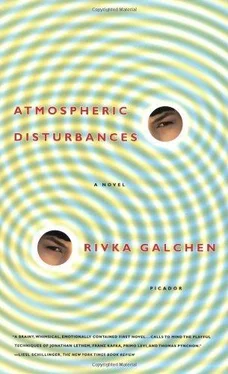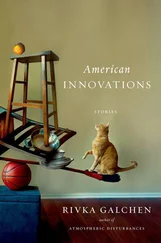Did this other husband know the doppelganger’s dog, the dog who was like an echo of Magda’s dog?
“You can tell him what I said,” Magda said, nonresponsively. “I don’t care; it’s not a secret, my feelings. I’m not one to keep secrets. Not about those sorts of things.”
“When,” I asked again, “when did you say — when did you meet him?”
“But that’s okay if you like him. Beneath your awkwardness and reserve you fall upon me as a nice man. There’s nothing wrong with liking somebody, at least not necessarily,” she said.
“How long have you had this dog?”
Then Magda looked closely at me for what may have been the first time — maybe I still had crumbs on my face — and she did not seem to recognize me. “You’re dressed rarely,” she said.
“Me?”
“You’re wearing heavy wool. And it’s summer. You’re dressed all wrong. For the weather.”
“Yes, well, the weather was different. It was cold where I came from.”
“I should apologize,” Magda said, pushing her hair back over her shoulder. “For my behavior. I’m so rude to not be asking you more about yourself. Just going on about Rema’s husband. Not making you comfortable. What a terrible host I am,” she said, laughing girlishly, performing happiness. “Let me at least go and bring us some pistachios—” And she rose from her chair, which made her shadow terrifying to me.
“No really, it’s all right,” I said.
“You don’t like pistachios?” she asked, pursing a heartbreaking pout beneath her monstrous shadow.
“Oh I love pistachios,” I said. A gross exaggeration.
“Oh good,” she said, and disappeared again down the hallway.
The dog chose not to follow her, chose instead to watch over me.
It was wholly obvious, her avoidance of the other husband issue.
But me too, I might have been focusing on the wrong issues. In my training, years ago, I had met a patient jaundiced to a curry who had never thought to worry about the changes in his skin and eye color but instead had arrived at the hospital extremely anxious about an insignificant nevus. That yellowed man, displacing his worries onto the meaningless sign, came to my mind then, in Magda’s brief absence, as I worried about pistachios. Did Rema really have some other husband? Maybe she could have deceived me, I’ll admit that — I can admit that — but how, what with sleeping in my bed every night, could Rema have tricked him, whoever he was, Anatole or not Anatole, purportedly (purported by me) my friend? In my mind — I knew it was just in my mind — I heard terrible laughter. I ate another cookie. And then another cookie, before I’d even swallowed the previous.
Magda returned with a bowl of pistachios, the kind dyed red, and before I could say thank you she began speaking.
“It’s been years since I’ve seen Rema,” she said. “She calls exactly once a month but won’t give me her phone number and won’t really say anything of substance, just talks instead about things in the news, only the most random things, like new discoveries about Saturn’s moon she brought up recently, as if these are somehow personal events. I can’t bring up anything real, anything personal, because then she shouts at me and hangs up the phone. You must think I’m terrible that she isolates herself from me but really it’s not that at all, it’s just that I can’t have those kinds of conversations that she feels comfortable in, I can’t have them; they are too ugly to me. When you said you’d seen Rema so recently, well, I didn’t want to tell you everything on the phone because I was afraid that then you wouldn’t want to come over here to speak with me, that you’d have a horrible misimpression and then my chances would be lost—”
I might note that Magda was crying through most of those words. People cry in front of me fairly often, so I have had ample opportunity to consider how one ought to handle such situations, and yet still, I admit, I am not very gracious in responding to performances of emotion. Obviously one can put an arm around the other person, or extend a hand, or murmur sympathetically. Or be silent. In my professional situation, I have (I believe correctly) chosen to adopt the most reserved among these options, because even just a single kind word can turn a few tears into a torrent, and one certainly doesn’t want to ungate such a flood: it’s just not useful. One can watch movies on one’s own time, alone, for that sort of therapy. So — and yes perhaps this was wrong, or at least culturally unacceptable — I just sat there silently pretending not to notice the woman’s — Rema’s mother’s — Magda’s — tears. I sat with my eyes downcast and averted, as if Magda were naked. This was my attempt at restoring her dignity to her. There’s a downside, of course, to such a strategy. Dogs offer more comfort than I do. But there’s also this efficiency in which, when you watch someone cry, it can wholly relieve you of the impulse to do the same.
“You’re not Argentine,” Magda eventually said, recovering herself.
I looked down at my fingers that were stained pink from the pistachios I’d just eaten. It struck me that while she’d been crying I’d probably been making a great deal of noise, cracking those shells, chewing those nuts, sucking the salt off.
I have never, for even a minute, believed myself a meteorologist. I wouldn’t want certain concessions I’ve made to my current reality to undermine an accurate understanding of the predicament I was in, a predicament that gave me little choice other than to retreat into the kind of inventiveness that resembles deceit and/or psychosis. And that is why I have gone to the trouble of detailing all the seeming irrelevancies of my initial meeting with Magda. I would like the position I was in at that time to be appreciated. Just think: I did not know where my Rema was, I did not know how much to reveal to Magda about my true identity, I was being watched by a strange dog, and in addition to all the unwelcome data that had been accumulating prior to my arriving at Rema’s childhood home, there was suddenly this unforeseen, somewhat unassimilatable information about Rema having some other husband. Not to mention that: my luggage was missing, my home phone had been mysteriously ringing, my patient had gone absent, someone claiming to be from the Royal Academy had offered me a fellowship, and an old meteorologic research paper had seemed, in its way, to have spoken to me. On top of all this an objectively attractive woman had wept before me, while I sat in sweaty clothes with red pistachio dye on my hands and the corners of my mouth sore from salt. Who, in such a situation, would be safe from slipping into a second small ego-protective lie?
“So — I’m sorry — how did you meet my daughter and her, well, and him?” Magda asked, after having recollected herself.
I nodded my head and held up a finger as if to say “one moment,” and then I proceeded to put more pistachios in my mouth, then sip again of the horrible maté, and then eat another cookie, the second to last. Unlike Rema, I’ve no knack for spontaneously inventing stories. In fact, quite the opposite. I can hardly tell anecdotes that are true. Except for the refuge of asking questions, I find speaking very challenging. That’s part of why I’m inevitably the first to finish my meal at any gathering, because my main delay tactic when I’m asked a question is to eat.
Through the echo-y internal din of molar pistachio devastation, I heard Magda say, trying to speak for me: “You are a colleague of her husband’s? You are also a psychiatrist?”
I found myself shaking my head — a gesture that can signal either denial or sorrowful disbelief — and swallowing. I like so few of my colleagues.
Читать дальше
Конец ознакомительного отрывка
Купить книгу












